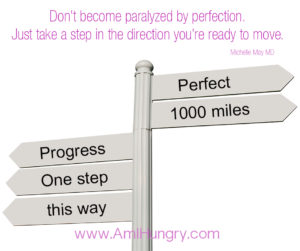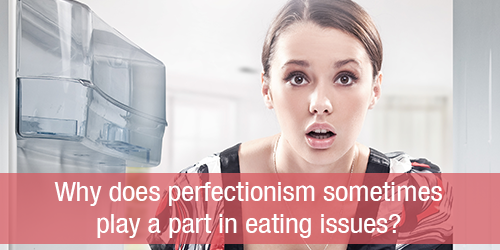Perfectionism often plays a part in eating struggles. Learning to recognize and manage perfectionism is an essential step in recovery from disordered eating. In this article, we’ll explore the signs of perfectionism, the impact it has on our eating, and how to shift toward “good enough.”
Perfection is an impossibly high standard!
 “If I’m wearing clothes, the laundry isn’t done!”
“If I’m wearing clothes, the laundry isn’t done!”
We all burst out laughing at the absurdity and the truth in this statement made by Katharine, a participant in one of our Am I Hungry? Mindful Eating Retreats. She was telling us how hard she is on herself and how impossibly high her standards are for “deserving” a break.
What does that have to do with eating? Everything!
Perfectionism is one of the accelerating forces in the eat-repent-repeat cycle. You may remember reading about my personal experience with this type of thinking in the opening of chapter 3 in Eat What You Love, Love What You Eat. Learning to recognize and manage perfectionism was a turning point in my personal recovery from disordered eating.
Do you have perfectionism?
 Or perhaps better said, does perfectionism have you?
Or perhaps better said, does perfectionism have you?
To understand how perfectionism can interfere with eating, activity, and self-care, it helps to understand the symptoms of perfectionism.
People who struggle with perfectionism often…
- Set excessively high performance standards, attempt to achieve unrealistic goals, and strive for an unattainable ideal.
- Invest a significant amount of time and energy trying to meet their impossibly high standards.
- Measure their self-worth by their productivity and accomplishments.
- Set themselves up for dissatisfaction and disappointment.
- Are overly critical and harsh in their self-evaluation.
- Are overly concerned about how others evaluate them.
- Fear that others will reject them if they aren’t perfect.
- May experience anxiety about potential failure.
- May put a lot of pressure on others to be perfect too, including partners, children, employees, and co-workers.
- May have difficulty connecting with others because they may be perceived as being “too good” (when in fact, their greatest fear is not being good enough).
- Difficulty finishing projects (and sometimes, e-newsletters!).
Bottom line: Expecting perfection from yourself and others guarantees that you’ll never be happy.
Why does perfectionism cause problems with eating?
Katharine realized that she was eating to give herself a break, since “real” breaks to relax weren’t allowed until everything was finished to perfection. And of course, it never would be! In other words, her perfectionism and eating were closely connected.
There are many other ways that perfectionism can interfere with a healthy relationship with food. Some examples:
- Perfectionism eats up your time and energy, leaving little time for self-care.
- You may eat to relieve the stress and anxiety of constantly striving for perfection.
- You may reach for food to console yourself when you feel bad or frustrated about failing to meet the mark.
- You might be striving for the perfect body (whatever that is), leading to unhealthy eating or exercise behaviors.
- You might expect yourself (or others) to eat perfectly (whatever that means). Have you heard of orthorexia?
- If you also struggle with “all or nothing” thinking (as many people who struggle with food do), you might binge when you fail to “do” your diet perfectly (“I’ve already blown it; I might as well keep eating”).
- You might expend a lot of effort hiding your overeating or binge eating in order to maintain the outward appearance of having it all together.
- You might be struggling with shame and guilt about this “double life” and that can drive more emotional eating.
- You might live in fear of people discovering your secret or isolate yourself to avoid being “found out.”
- You might feel like you are never good enough; this painful thought may leave you feeling undeserving of joy.
Perfectionism is often a long-standing habit that has provided some rewards in addition to the difficulties. That’s why overcoming perfectionism isn’t easy – but it is essential.
Striving for “good enough”
 I once heard that the difference between good enough and perfect is a logarithmic increase in effort! What if you were to invest that time and energy in self-care instead?
I once heard that the difference between good enough and perfect is a logarithmic increase in effort! What if you were to invest that time and energy in self-care instead?
There’s nothing wrong with wanting to do your best, if you accept that your best probably isn’t going to be perfect in most areas of your life. Most of the time, good enough is good enough!
Here are some messages straight out of Eat What You Love, Love What You Eat to help you make the switch from “too perfect” to “good enough.”
About eating:
- Perfection isn’t possible, and fortunately, it isn’t necessary.
- Don’t make new rules like, “Only eat when you’re hungry” or “Stop eating when you’re full.” Hunger and fullness are helpful tools, not rules.
- Let go of the need to get it right and, instead, approach eating with flexibility and self-acceptance.
- Balance eating for nourishment with eating for enjoyment.
About exercise:
- No person and no schedule are ever perfect, but thinking you have to do it perfectly will derail you every time.
- In order for physical activity to become part of your life, try to be as consistent but as flexible as possible.
- It’s human nature to experience varying levels of enthusiasm for exercise. Keep in mind that your goal is not perfection. Rather, strive to increase your activity most days of the week and accept that there will be days when it’s more challenging than others.
About living mindfully:
- Think direction, not perfection.
- Ask yourself: “Is there a more reasonable expectation I could have about this situation or myself? What would be a more realistic and empowering way of talking to myself about this?”
- Be willing to make mistakes since they are an opportunity for learning and growth.
- Be vulnerable. Let people you trust see your imperfections and fears. This can deepen intimacy and free you from the need to be perfect.
The irony of all this is that when I gave up perfectionism, resolved my disordered eating, and began working with others to heal their relationship with food and their bodies, I discovered that each of us is inherently perfect; we just need to learn how to get out of our own way!
This article was updated from a previous version.
If you enjoyed this article, here are three more to help you:
Diet culture: An outdated paradigm whose time is up!
In Charge or In Control: Which Are You?


